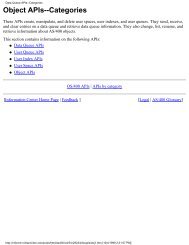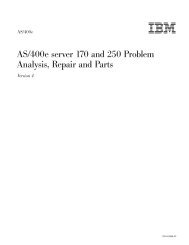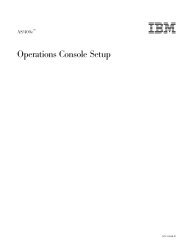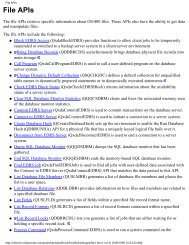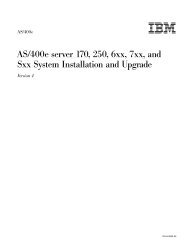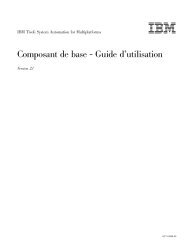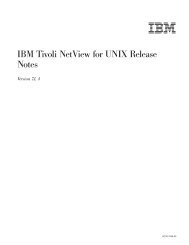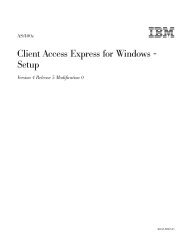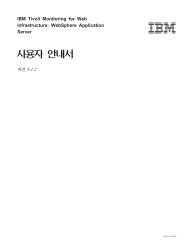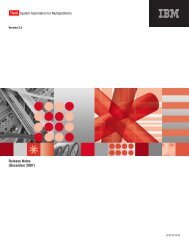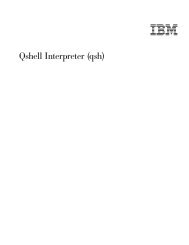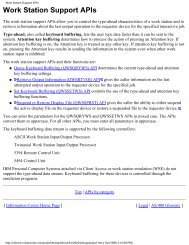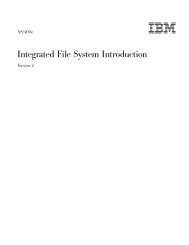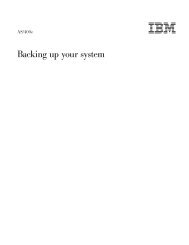Create successful ePaper yourself
Turn your PDF publications into a flip-book with our unique Google optimized e-Paper software.
30 <strong>File</strong> <strong>Management</strong> V4R5<br />
Depending on the file type, the program must either close the file and open it<br />
again, release the device and acquire it again, or acquire the session again. To reset<br />
an error condition in a shared file by closing it and opening it again, all programs<br />
sharing the open data path must close the file. In some cases, the message may<br />
instruct you to reset the device by varying it off and on again. It is unlikely that<br />
the program will be able to use the failing device until the problem causing the<br />
error is found and corrected, but recovery within the program may be possible if<br />
an alternate device is available.<br />
Some of the minor return codes in this group are the same as those for the 82<br />
major return code. Device failures or line failures may occur at any time, but an 81<br />
major code occurs on an I/O operation. This means that your program had already<br />
established a link with the device or session. Therefore, the program may transfer<br />
some data, but when the program starts from the beginning when it starts again. A<br />
possible duplication of data could result.<br />
Message numbers accompanying an 81 major code may be in the range that<br />
indicates either an I/O or a close operation. A device failure on a close operation<br />
simply may be the result of a failure in sending the final block of data, rather than<br />
action specific to closing the file. An error on a close operation can cause a file to<br />
not close completely. Your error recovery program should respond to close failures<br />
with a second close operation. The second close will always complete, regardless of<br />
errors.<br />
Device or session error on open or acquire operation<br />
A major return code of 82 indicates that a device error or a session error occurred<br />
during an open or acquire operation. Both the minor return code and the<br />
accompanying message will provide more specific information regarding the cause<br />
of the problem.<br />
Some of the minor return codes in this group are the same as those for the 81<br />
major return code. Device or line failures may occur at any time, but an 82 major<br />
code indicates that the device or session was unusable when your program first<br />
attempted to use it. Thus no data was transferred. The problem may be the result<br />
of a configuration or installation error.<br />
Depending on the minor return code, it may be appropriate for your program to<br />
recover from the error and try the failing operation again after some waiting<br />
period. You should specify the number of times you try in your program. It may<br />
also be possible to use an alternate or backup device or session instead.<br />
Message numbers accompanying an 82 major code may be in the range indicating<br />
either an open or an acquire operation. If the operation was an open, it is<br />
necessary to close the partially opened file and reopen it to recover from the error.<br />
If the operation was an acquire, it may be necessary to do a release operation<br />
before trying the acquire again. In either case, you should specify a wait time for<br />
the file that is long enough to allow the system to recover from the error.<br />
Recoverable device or session errors on I/O operation<br />
A major return code of 83 indicates that an error occurred in sending data to a<br />
device or receiving data from the device. Recovery by the application program is<br />
possible. Both the minor return code and the accompanying message provide more<br />
specific information regarding the cause of the problem.



